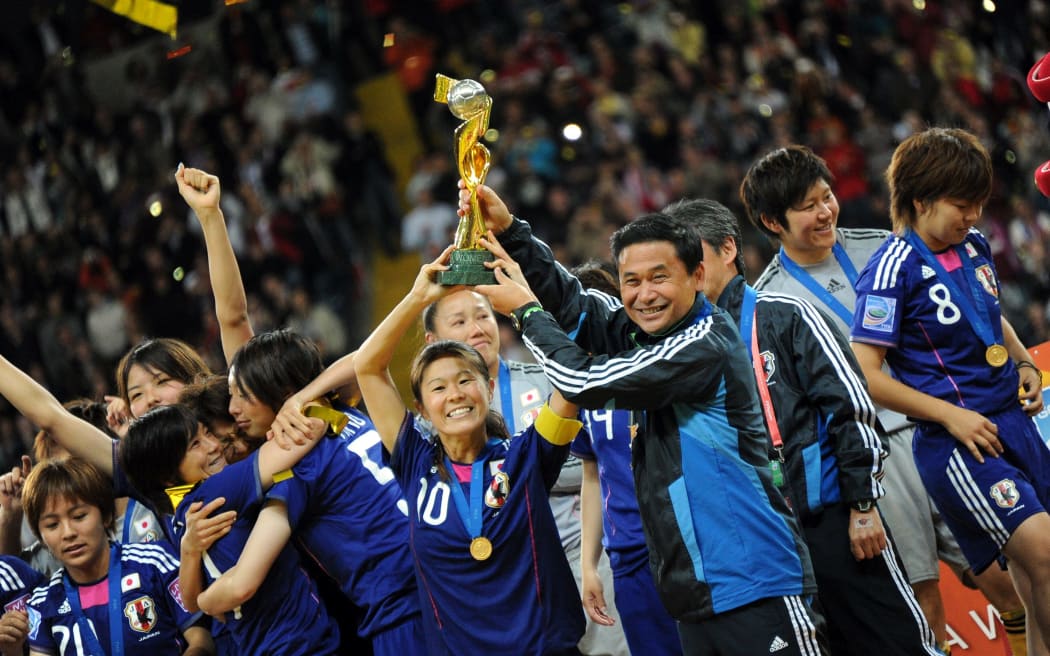
Japan won the 2011 FIFA World Cup.
Photo: Photosport
From Pia Sundhage to Sarina Wiegman to Bev Priestman, the ninth Women’s World Cup will be a glittering showcase of some of the game’s most successful coaches but 20 of the 32 teams will still have men barking the orders from the touchline.
From Pia Sundhage to Sarina Wiegman to Bev Priestman, the ninth Women’s World Cup will be a glittering showcase of some of the game’s most successful coaches but 20 of the 32 teams will still have men barking the orders from the touchline.
Twelve female coaches represents a record number for the global showpiece, and is a significantly higher proportion than in most other sports, but some are questioning why it is still not greater.
Vicky Huyton, founder of the Female Coaching Network, said a lack of success was certainly not a factor.
Since 2000, all but one of the major women’s football tournaments – the Women’s World Cup, Women’s Euros and the Olympics – have been won by female-coached teams, she pointed out.
Norio Sasaki, the man who coached Japan to World Cup gold in 2011, is the sole exception.
“It’s a stat I find fascinating – and it’s a trend across many different sports, but particularly in women’s football,” Huyton said.
Football’s female coaching landscape is a good news/bad news scenario.
Women coaches make up 37.5% at the World Cup, which kicks off Thursday, the same as in 2019 and slightly higher than 2015.
“It’s one of the better sports for female coaches,” Huyton added. “Which is kind of like saying it’s the best of a bad bunch rather than necessarily a positive thing.”
At the other end of the scale are athletics, rugby and tennis. Fewer than 1% of athletics coaches at the world championships or Olympics are women, Huyton said, and only 4% of the top 200 women on the WTA Tour are coached by women. Huyton also worries about the lack of new faces among the women who have a top job in international football.
“We now know that female coaches can be successful – how novel,” Huyton said with a half-hearted laugh.
“So the narrative has changed to, ‘Well, how do we get more female coaches?’ Because if you look at the list of women at the World Cup, they’re all the same group of women mostly.”
Sundhage, who coaches Brazil, led the U.S. to back-to-back Olympic golds.
Wiegman coached the Netherlands to the 2017 Euro title and World Cup silver in 2019 before leading England on a 30-game unbeaten streak.
Germany’s Martina Voss-Tecklenburg also coached Switzerland for six years.
‘VISIBILITY IS HUGE’
FIFA expects the World Cup to reach a global TV audience of two billion viewers, which would be a 79% increase over the highly successful 2019 tournament.
Canada midfielder Sophie Schmidt said the mere sight of a dozen female coaches pacing the touchlines Down Under could be a big boost to young women looking to take that career path.
“This visibility is huge for inspiring others … it allows people to see the possibilities,” said Schmidt.
“In the past, it’s been predominantly men. But we have very amazing, talented, gifted female coaches out there and I think the opportunities are there and once you start seeing it, you start believing it.
“That’s the beauty of having so many female coaches in these head roles.”
Among the biggest barriers to coaching, Huyton said, is certification. The top-level UEFA Pro License course costs close to 10,000 pounds ($13,090) and applicants must have a full-time coaching position at the senior level.
“So where does that woman go to get that experience to then get the qualification?” Huyton asked.
England’s Women’s Super League has helped pave the way for female coaches, with 20 of the 50 total managers over a span of 10 years being female.
The WSL has boasted some of the best in the game, including Hope Powell, the first woman to be awarded the UEFA Pro License in 2003, and Emma Hayes, who has coached Chelsea to seven of the last nine WSL titles, including this year.
While players’ union FIFPRO does not have an official view on the gender of coaches, Sarah Gregorius said diversity was critical.
“There should be inclusive policies in the way in which coaches are recruited and searched for,” said Gregorius, who directs the union’s global policy and strategic relations for women’s football.
“There needs to be pathways for people from all different backgrounds, genders, identities, whatever it may be, to reach those positions.”
– Reuters
Stay connected with us on social media platform for instant update click here to join our Twitter, & Facebook
We are now on Telegram. Click here to join our channel (@TechiUpdate) and stay updated with the latest Technology headlines.
For all the latest Sports News Click Here
For the latest news and updates, follow us on Google News.
